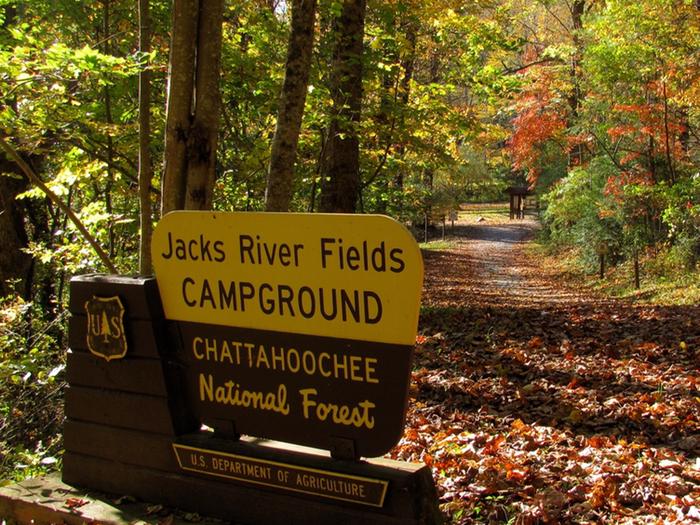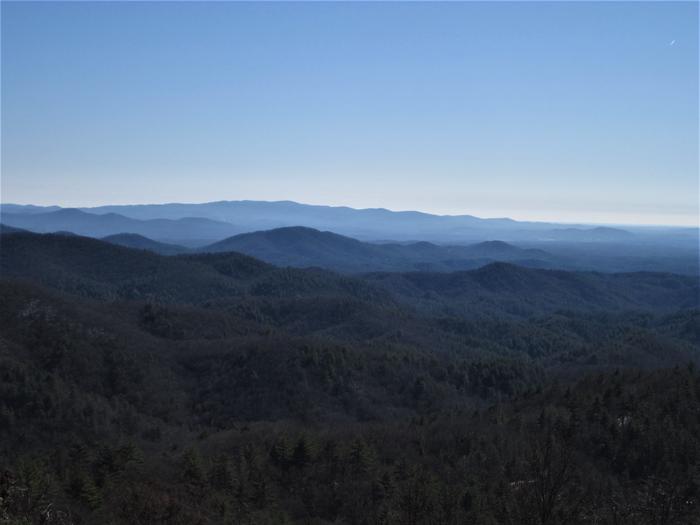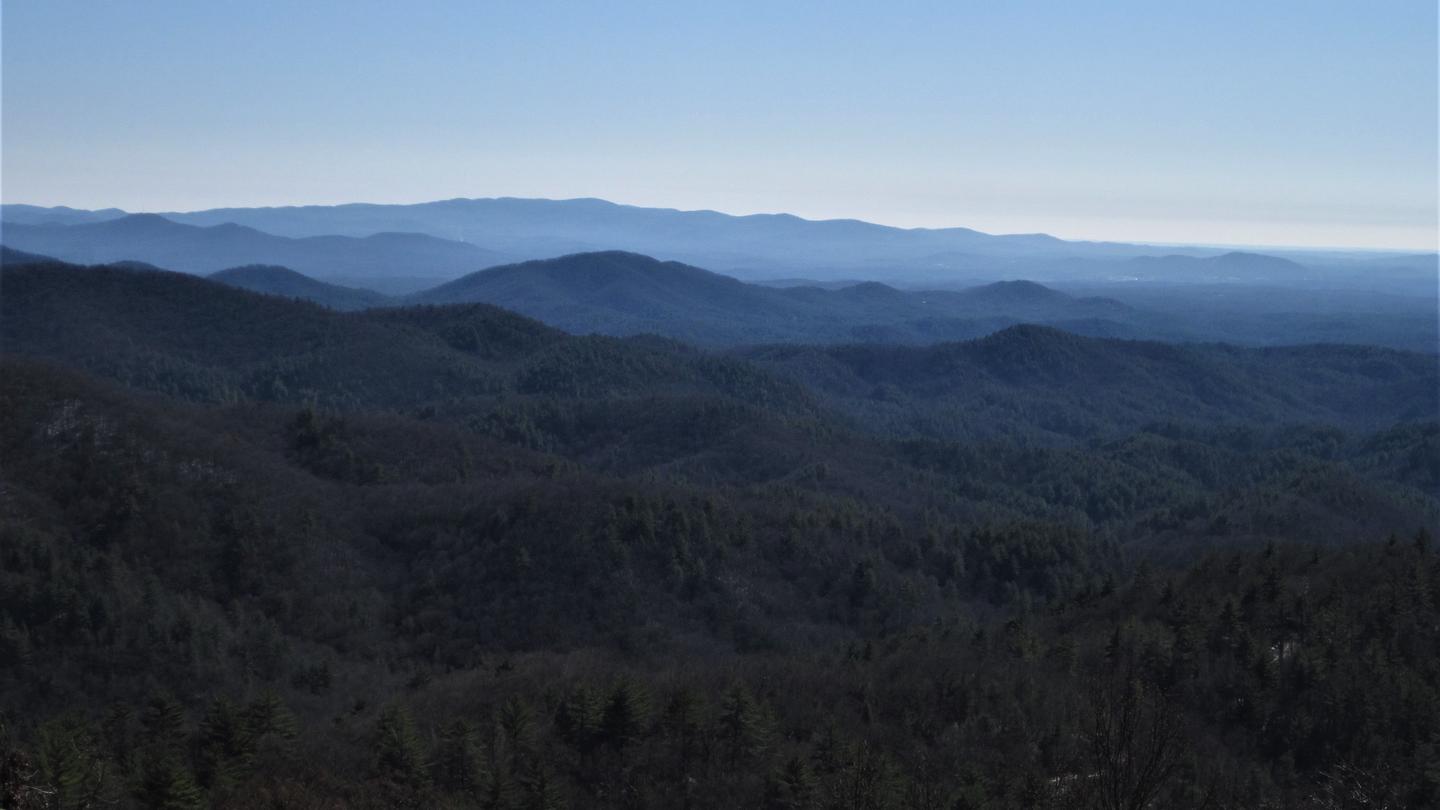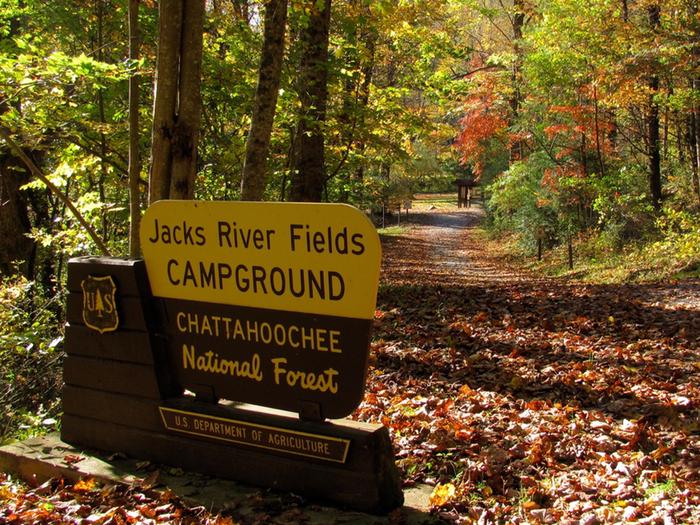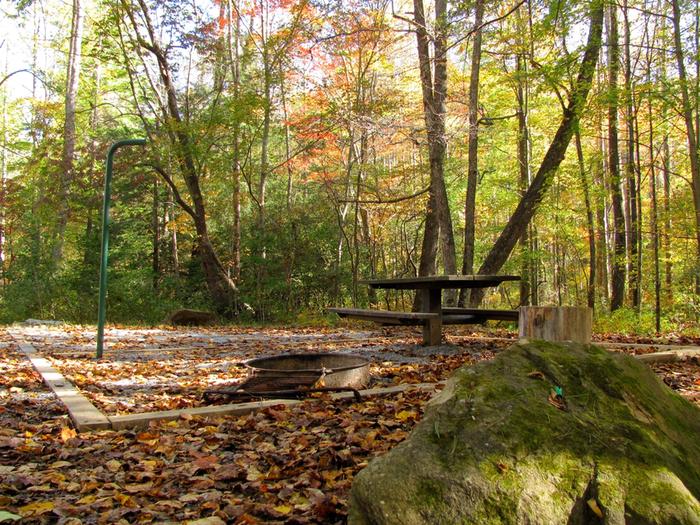Jacks River Fields Campground
Chattahoochee-Oconee National Forest
The Jacks River Fields Campground is a seven site campground located in the Blue Ridge Mountains of North Georgia on the Conasauga Ranger District of the Chattahoochee-Oconee National Forest. This campground accomodates horses and mules. This location is available on a first-come, first-served basis only. Visitors are required to physically arrive at the campground to purchase and claim a site. Once on-site, you can pay for your campsite(s) by scanning a QR code using the Recreation.gov mobile app or by following instructions for depositing cash or checks in the fee deposit box. Download the free Recreation.gov mobile app on Android or iOS prior to your arrival as some remote areas have limited or no cellular service.
Located along the South Fork of the Jacks River, the Jacks River Fields Campground sits at an elevation of 2700' and surrounded by mixed hardwoods, hemlock, and rhododendron. Wildlife such as bear, deer, and wild turkey can be found in the surrounding forest. Wildflowers are abundant throughout the mountains during spring, summer, and fall.
From the late 1800s into the early 1900s this area was a thriving community known as the Upper Jacks River Community, complete with home-sites, a church, and possibly a grist mill. One of those houses was later turned into a Federal game warden station. The game warden was tasked with patrolling the newly established national forest. The community long gone, including the game warden station, visitors can now enjoy a quiet camping experience deep in the mountains. The multi-use South Fork Trail is located adjacent to the campground, allowing for horses, bikes, and hikers.
Tent pads, parking spurs, picnic tables, fire rings, and lantern posts are provided at each campsite. Bear-Proof trash cans are centrally located in the campground. There is no running water, no electricity, and no dumping station located at this campground. A vault toilet is provided for visitors.
A horse trailer day use parking area is located at the back of the recreation area, along with horse corrals and hitching posts.
Need to Know
This campground currently accepts cash, checks, and credit cards.
Use the following steps to pay with a credit card: Download the Recreation.gov app and create an account prior to arrival. Once you have the Recreation.gov app and an account on your mobile device, no internet service is needed. Upon arrival, pick your campsite, then open your Recreation.gov app and tap the Scan function within the app on your device. The app will access your phone's camera. Using the app, Scan the QR code. Follow the prompts to pay. Once again, no internet service is needed as long as you have and use the Recreation.gov app prior to arrival. These instructions are also on site.
Access to this campground requires a 15+ mile drive on steep, narrow, winding, gravel roads in mountainous terrain. Road conditions change with the weather and at times can be hazardous. Travel Trailers over 25 feet are not recommended.
Bring your own equipment and supplies. The nearest gas station and store is 16 miles away in Blue Ridge, GA.
Cell phone service is extremely limited and unreliable in this area.
Alcoholic beverages are prohibited. (36 CFR 261.58bb)
Be Bear Aware: Store food and trash properly. Never leave food/trash out on tables or in the open. Store unattended food/trash in bear-resistant containers, in a vehicle in solid non-pliable material, or suspend food/trash at least ten feet off the ground. Remember to use the bear resistant trash receptacles provided at this facility. (36 CFR 261.58cc)
Fireworks and other Pyrotechnics are Prohibited. (36 CFR 261.52f)
14-Day Forest Stay Limit: Camping or maintaining a campsite in developed and dispersed areas in excess of 14
days within any 30-day time period. After the camper(s) has accumulated 14 days
within any 30-day time period, the camper(s) must leave that area/campground and
move from Chattahoochee-Oconee National Forest land before returning for
another stay. (36 CFR Section 261.58a)
Pets must be leashed at all times (36 CFR 261.16J) and are prohibited in the swimming area (36 CFR 261.16k).
It is prohibited to cut live vegetation or any standing tree whether dead or alive. Firewood may be collected from the forest for use while camping. Only collect wood that is dead and down. Dead trees play an important role as homes for wildlife and insects. (36 CFR 261.6a)
Quiet hours are from 10 p.m. to 6 a.m. Generators are allowed during daylight hours, but may not be used in a manner or at a time which unreasonably disturbs other forest visitors. (36 CFR 261.10i)
For all Chattahoochee-Oconee National Forest Rules, Regulations, and Forest Supervisor's Orders please visit: Chattahoochee-Oconee National Forest Rules, Regulations, and Forest Supervisor's Orders
Natural Features
Surrounded by forested mountains, the Jacks River Fields Campground is situated in a small hollow in the Blue Ridge Mountains. The South Fork of the Jacks River flows alongside the campground, joining other tributaries, forming the Jacks River.
Jacks River meanders through the 45,000 acre Cohutta Wilderness from the southeast to the northwest, joining the Conasauga River near the Tennessee/Georgia state line. The Conasauga River is one of the most diverse rivers in the United States. The Conasauga Watershed contains 76 native fish - more than the Columbia Watershed and Colorado Watershed combined! The geography and elevation changes of the Southern Appalachian Mountains has enabled aquatic species in small watersheds to attain extreme levels of diversity compared to the much larger western watersheds. Salamanders, mussels, snails, crayfish, and other invertebrates show similar levels of diversity.
Nearby Attractions
South Fork Trail:
The South Fork Trail is located approximately 1/8th of a mile from the Jacks River Fields Campground. This trail meanders through fields and hardwood forests along the banks of the south fork of the Jacks River. One river ford is experienced near the north end of the trail. Be alert, this is a multi-use trail open to equestrians, hikers, and bicycles.
Cohutta Wilderness:
Located nearby is the 45,000 acre Cohutta/Big Frog Wilderness (the largest Congressaionally designated Wilderness Area located east of the Mississippi River.). The Cohutta Wilderness contains 91 miles of arduous backpacking trails. Horses are allowed on some of the trails in the Wilderness, please contact the Conasauga Ranger Station for more information.
Recreation
Hiking and Horseback Riding:
This campground is located adjacent to the South Fork Trail, which is a multi-use trail for hiking, biking, and horse riding. The Cohutta Wilderness is nearby and allows for arduous overnight backpacking trips along the Jacks and Conasauga Rivers.
Hunting:
Hunting for bear, deer, and wild hogs is a long standing fall tradition in the North Georgia Mountains. This campground is located within the Cohutta Wildlife Management Area, a cooperatively managed area between the U.S. Forest Service and the Georgia Department of Natural Resources. The WMA is located completely within the boundaries of the Chattahoochee National Forest.
Birding:
During spring and summer, songbirds abound. Beginning in early spring, neotropical migrant birds are found traveling from South America and Mexico to their breeding grounds in the Appalachian Mountains from Georgia to Canada, many are only encountered during migration. For many birds, this area is the only place in the Southern Appalachians they breed, making for a unique experience for forest visitors.
Wildflowers:
The Southern Appalachians are one of the most diverse regions in the world for plants. Many of these plants produce flowers which are brightly colored, luring in pollinators such as native bees, butterflies, and hummingbirds. Other flowers are hidden beneath the leaf litter, unnoticed by the majority of visitors, yet noticed by the beetles that pollinate the unique flowers. These flowers eventually turn into fruits and seeds, feeding birds and small mammals.
Rental Options
Learn more about gear rental options for your trip
Available Campsites
- Site 004, Loop main, Type Standard Nonelectric
- Site 001, Loop main, Type Standard Nonelectric
- Site 003, Loop main, Type Standard Nonelectric
- Site 007, Loop main, Type Standard Nonelectric
- Site 005, Loop main, Type Standard Nonelectric
- Site 002, Loop main, Type Standard Nonelectric
- Site 006, Loop main, Type Standard Nonelectric
